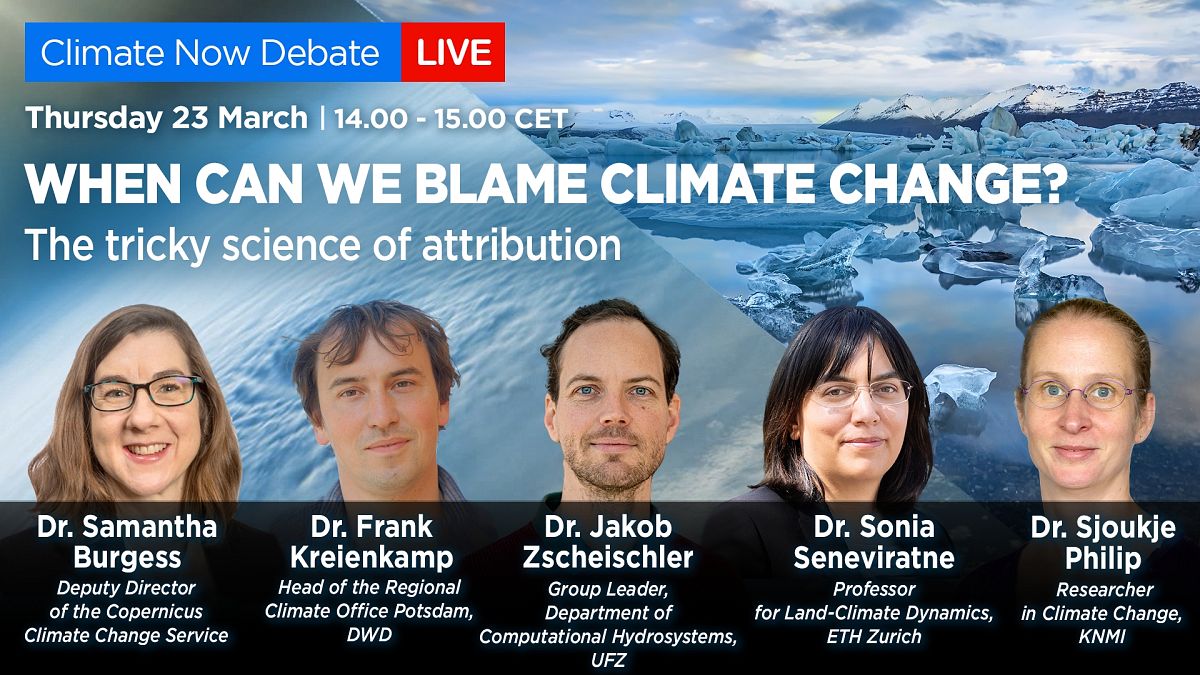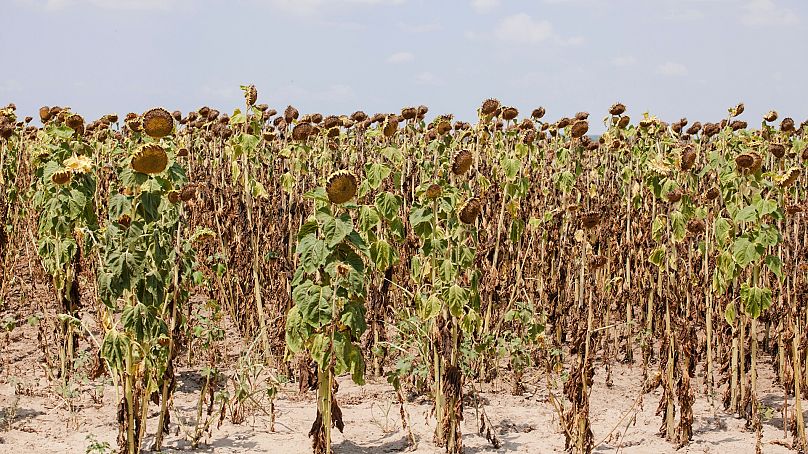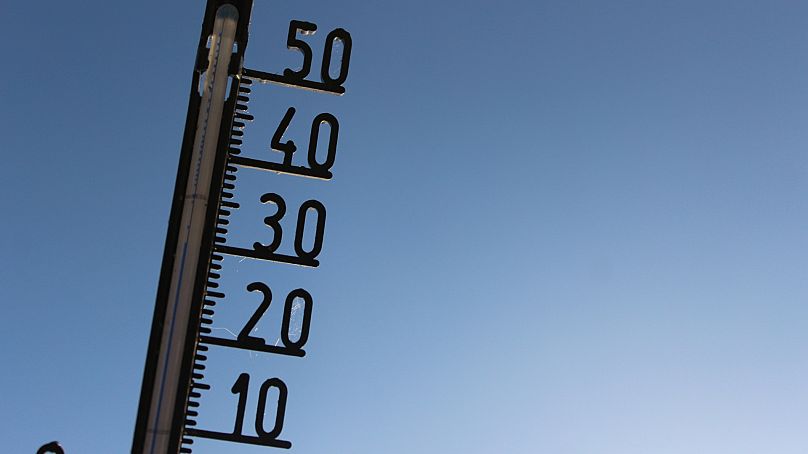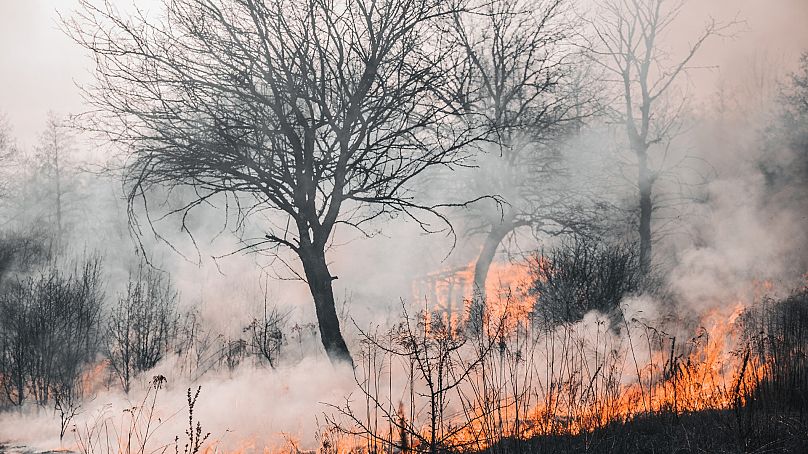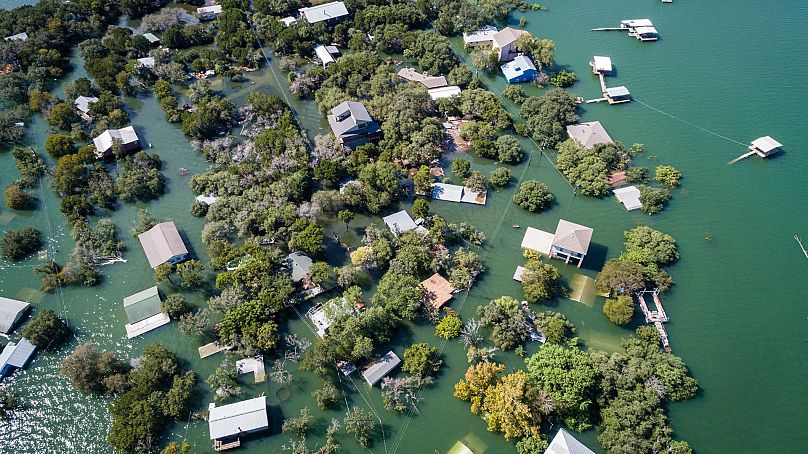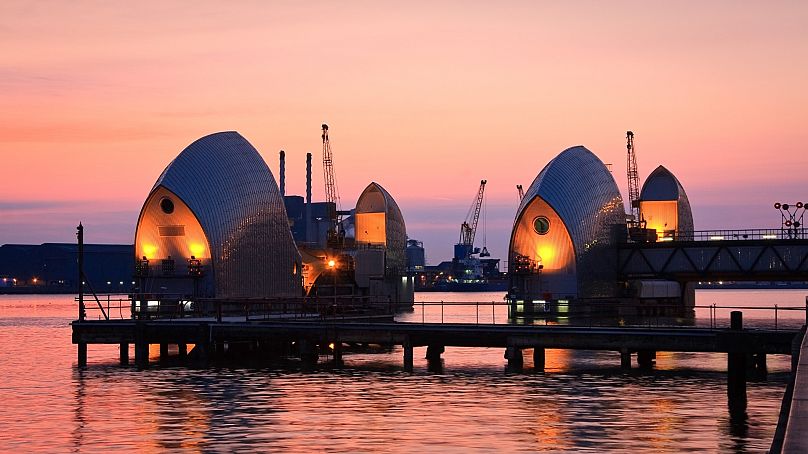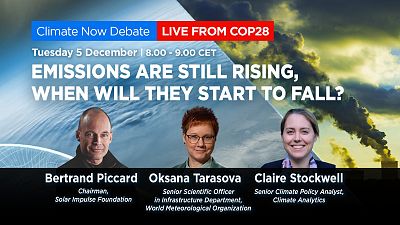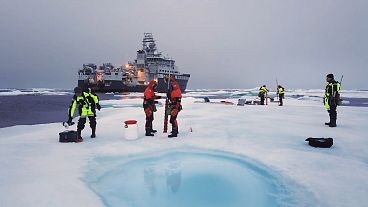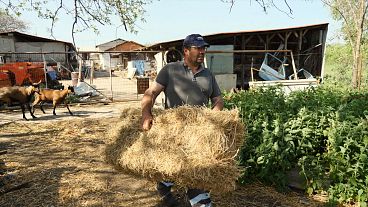Extreme weather events are on the increase globally, but can we blame climate change?
Extreme weather events are increasing in many parts of the world, but can we always blame their mounting severity on climate change?
In the aftermath of a heatwave, flood or drought, public interest is often intense, but can scientists really pinpoint whether a storm was made worse by climate change, and how can the science of extreme weather event attribution help them to do so?
These questions and more were at the heart of Euronews' latest Climate Now debate. Our panel of experts discussed the role that extreme weather attribution plays in educating the public about the link between climate change and today's weather.
They also considered whether fossil fuel companies or governments could be held accountable for their actions, now that scientists are able to prove that some extreme weather events are caused by human-induced climate change. And if climate change continues to heat up our world, how can scientists prepare us for the weather to come?
Watch the full debate in the video below:
What is extreme event attribution?
An emerging field of climate science, extreme event attribution, analyses whether extreme weather events, such as heatwaves, droughts or flash flooding, are caused by climate change. While scientists have been looking at extreme weather events for decades, due to the rigorous nature of scientific peer review, much of the research is not published in scientific journals until a year later.
Developed in the last decade, extreme event attribution aims to change this and engage more widely with the media and the general public. Scientists have discovered that once an extreme weather event passes, public interest begins to drop off quite quickly, so in order to keep the public's attention, it is vital that scientists offer quick answers about the causes of an extreme event.
“Of course we write scientific papers, but those will not be read by the adaptation decision makers, so we also worked together with communication experts, so nowadays we can communicate much better, and via the media it then also reaches the policymakers,” says Dr. Sjoukje Philip, Researcher in Climate Change at Dutch meteorological institute KNMI and member of the WWA group.
Founded in 2014, The World Weather Attribution Initiative (WWA) is a collaboration of scientists from the UK, Netherlands, France, USA, Switzerland and India, along with climate impact specialists from the Red Cross/Red Crescent Climate Centre (RCCC).
Although extreme event attribution has been in development since 2003, it is only more recently that scientists have been able to provide definitive data on whether an event is caused by climate change or not, as Dr. Sonia Seneviratne, Professor for Land-Climate Dynamics at Switzerland's ETH Zürich explains:
“I think what is particularly exciting now is that it’s not only about attributing the fact that some events are becoming more frequent, but that some of the events we are seeing are so much outside of everything we saw before that we cannot explain them without human-induced climate change.”
How does the WWA collect its data?
Until relatively recently, many scientists were relucant to directly link an extreme weather event to human-induced climate change. But as climate modelling has advanced and more observable data has been recorded, it is now possible for scientists to pinpoint a direct corellation in certain cases.
“Climate scientists can very quickly run an event with a series of climate models and then change the footing," says Dr. Samantha Burgess, Deputy Director of the Copernicus Climate Change Service.
"So they can run the event without any greenhouse gas concentrations in the atmosphere - so in a pre-industrial world - and then they can run the event multiple times in our current climate and see the range of probabilities"
By bringing together this range of data points, scientists are then able to state the degree to which the extreme weather event is more likely because of human-induced climate change.
Alonside climate modelling, scientists also collect data from the weather events in question. For heatwaves, they look at temperature, or wet bulb temperature if humidity is involved.
When it comes to analysing the impact of an event, the exact data used can also vary depending on the needs and activities of the local population. In agricultural communities, where populations mostly work outdoors, the WWA uses the local highest daily maximum temperature of that year to measure health risk, while in societies where most people work indoors, they have found that a 3-day mean temperature is more useful for their analysis.
This data is then presented to other scientists and the media, with the aim of helping them to deal with future occurences, something which is already happening.
“I think that’s one of the really nice contrasts, when we see the impacts of the 2003 heatwave versus the impacts of the 2019 summer heatwaves, the societal response was a lot stronger, a lot better, there was a lot less excess mortality because society was better prepared for these events,” says Dr. Samantha Burgess.
So, is climate change to blame for extreme weather events?
While the media often want a definitive answer, the facts are usually more complex. When it comes to extreme weather, WWA has found very clear links between heatwaves and climate change, they are influenced by other types of human behaviour, too.
For example, some heatwaves are partly driven by land use changes, such as logging and land clearance, where previously there had been trees and plant life that cooled the air through evapotranspiration.
WWA has also found significant climate change trends in cold weather extremes, but even here the story is complex, and shows how delicately balanced our ecosystems are.
In an analysis of the cold April of 2021, which had followed an unusually warm March and led to significant frost damage in the grape crop of central France, the analysts discovered a mixed picture.
While the team concluded that anthropogenic climate change had made the weather event 20 to 120 per cent more likely, they also discovered that without human-caused climate change, the temperature in April would have actually been approximately 1.2 degrees Celsius lower.
Crucially though, climate change had led to an earlier occurrence of bud burst on the grapevines, which meant that when the frost hit, the young leaves were exposed to lower temperatures, leading to more frost damage.
Could Extreme Weather Attribution lead to climate lawsuits?
One of the most intriguing questions posed by extreme event attribution is whether it could lead to climate change lawsuits against polluters such as fossil fuel companies or energy suppliers.
"We are seeing more and more that actually climate questions are coming into courts in different ways," says Dr. Sonia Seneviratne.
"I mean, that's one possible way to go, assigning blame. So by saying who is responsible in the end for the emissions we have had? And what are the consequences of those emissions because they are causing physically damage? Somebody has to pay for this."
To date, the landmark climate case is that of Peruvian farmer Saúl Luciano Lliuya, who filed a complaint against German energy company RWE in 2015, alleging that his farmland is threatened by climate change directly caused by RWE. The case is still ongoing, as RWE argues that a single company can't be held accountable for climate change impacts.
With many of the legal issues yet to be defined, for Dr. Samantha Burgess, the more important question is an intergenerational one.
"All of this is about historical emissions and the emissions that we're creating right now, and it has implications for the world that we're leaving the next generation and the generation after," she says.
"So will there be coral reefs? Will there be people living in the tropics? We know the tropics and the global south is much more vulnerable to climate change than where the emissions have come from historically. So what are the implications for the global north to support the global south and improve their resilience to a change in climate? For me, that's that's the much more critical question."
Can extreme event attribution help us to cope with future extremes?
Another area that attribution can help governments and policymakers with, is adaptation, explains Dr. Frank Kreienkamp, Head of the Regional Climate Office Potsdam, from German weather service DWD.
"If you look back to the flooding in 2021, we had a lot of government people asking us - 'Okay, climate change has changed the intensity and changed the possibility. What can we do as politicians to say, these are some of the places you cannot build a house?' - So they are asking us, what are the changes we need to make due to climate change?"
One of the ways attribution scientists are hoping to help policymakers with these questions is through a new area of research known as storylines.
"So the idea of this, for instance, is to look at an event that has recently happened and look at how this event would play out if we had even higher warming," says Dr. Sonia Seneviratne.
"And so we can try and develop this these storylines for the general public to help them understand what is going to happen."
Dr. Samantha Burgess agrees that the storyline approach is very important when it comes to helping people see the overall trends, without getting lost in the changes that happen due to seasonal variability.
"We're in the northern hemisphere, we're in winter, which means, you know, temperatures are cooler than they are in summer. And there's been record snowfall in California. But the European Alps have received approximately half of the snowfall they expected this year. So there's always variability in the system, right?" she says.
"So what is really important is to maintain the evidence base of these long term trends. And realise that variability is a natural part of our planetary system."
How does this data help the public to better understand climate change?
The aim of all of the WWA's work is to educate and inform, whether it's the wider public, fellow scientists or policymakers. By producing their reports as quickly as possible after an extreme weather event, they aim to make it available to the public while the event is still being widely discussed. By doing so, they hope to raise awareness of the role climate change is having on global weather patterns.
"We tend to think that everyone knows that climate change is happening," says Dr. Sjoukje Philip.
"But actually that's not true. So whenever an extreme event happens, it's a really good opportunity to show the people that are actually living there, that climate change is happening."
Meet our panellists:
Dr. Frank Kreienkamp, Head of the Regional Climate Office Potsdam, DWD
Dr Frank Kreienkamp is Head of the Regional Climate Office, Potsdam at the Deutscher Wetterdienst (the National Weather Service of Germany). He specialises in the statistical analysis of climate change, including changes in extremes and the process of communicating these results to politicians, administrations and the general public.
Dr. Sonia Seneviratne, Professor for Land-Climate Dynamics, ETH Zurich
Sonia Seneviratne is Full Professor for Land-Climate Dynamics at ETH Zurich. She is a climate scientist and environmental physicist. After her undergraduate and graduate studies at the University of Lausanne and ETH Zurich, she was awarded her PhD thesis in climate science in 2003 at ETH Zurich.
She was a Coordinating Lead Author and Lead Author on several IPCC reports, including the IPCC Special Report on 1.5°C Global warming (2018).
Dr. Sjoukje Philip, Researcher in Climate Change, KNMI
With a background in geophysics Sjoukje Philip began working at KNMI in 2015 in the field of rapid (weather) event attribution. She works on the rapid analysis of extreme weather events, including creating ‘trigger schemes’ to accurately predict how many people have been impacted.
Dr. Samantha Burgess, Deputy Director of the Copernicus Climate Change Service
Dr Samantha Burgess is Deputy Director of C3S, the European Union's Copernicus Climate Change Service, working to improve understanding of climate related risks. C3S provides open access to climate data globally to inform better decisions-making. Sam has previously focused on environmental resilience, sustainable finance & ocean governance in roles including chief scientific advisor & head of policy in government, in business, NGOs and academia.
Dr. Jakob Zscheischler, Group Leader, Department of Computational Hydrosystems, UFZ
Jakob Zscheischler is an Earth system scientist with a background in mathematics, biogeochemistry and climate science. His research focuses are compound weather and climate events. Jackob is the Chair of the European COST Action DAMOCLES (Understanding and modeling compound climate and weather events, CA17109), which brings together climate scientists, engineers, social scientists, impact modellers and decision-makers and coordinates national research projects on compound events.
Jeremy Wilks, Moderator
Euronews science reporter Jeremy Wilks covers everything from climate change to healthcare innovation. He has reported on science research, innovation and digital technology across Europe for over a decade. Jeremy is the presenter of the monthly Climate Now series on Euronews and presents the new Ocean Calls podcast.
